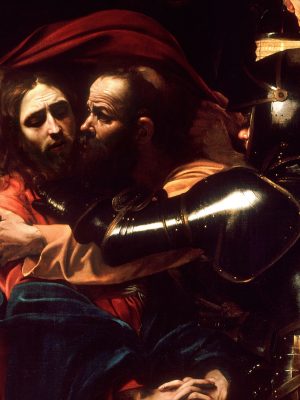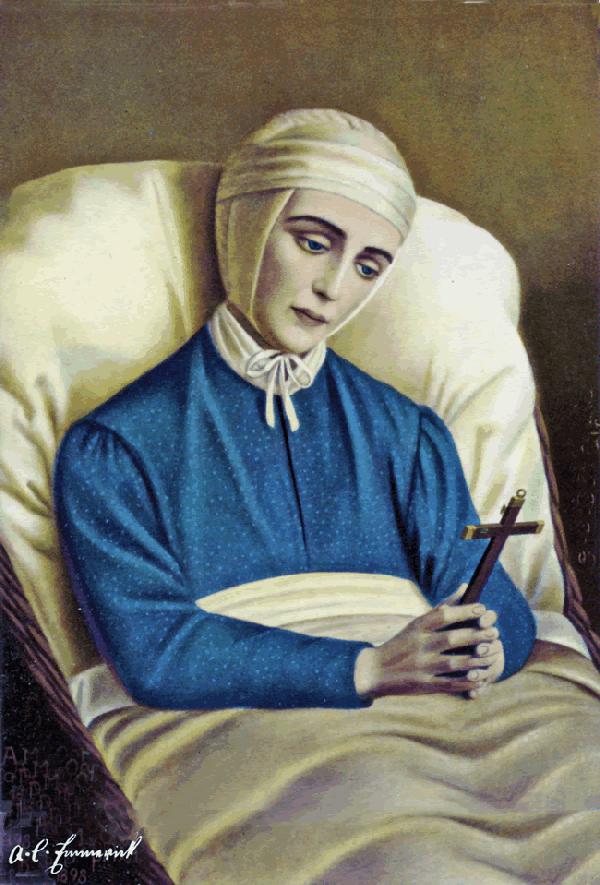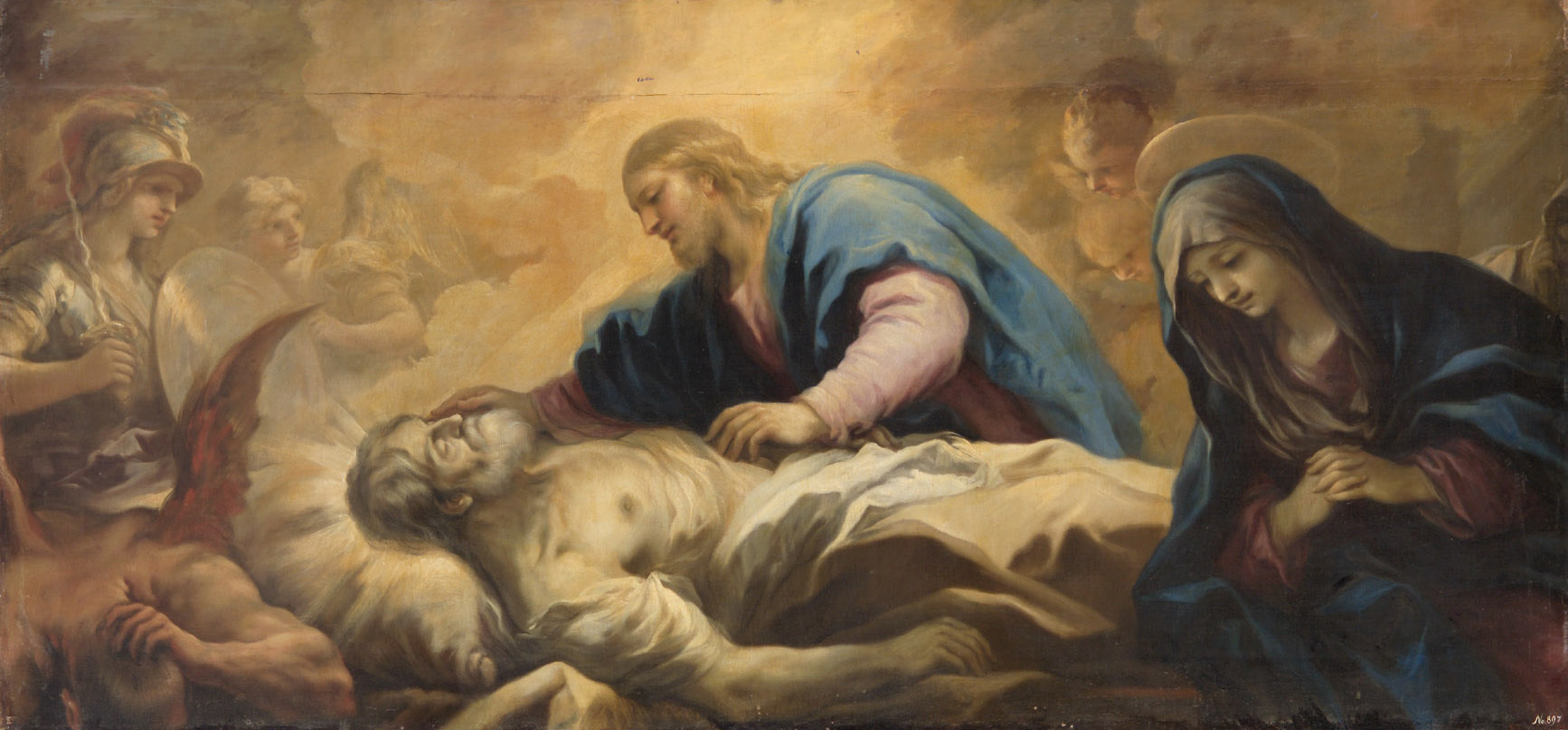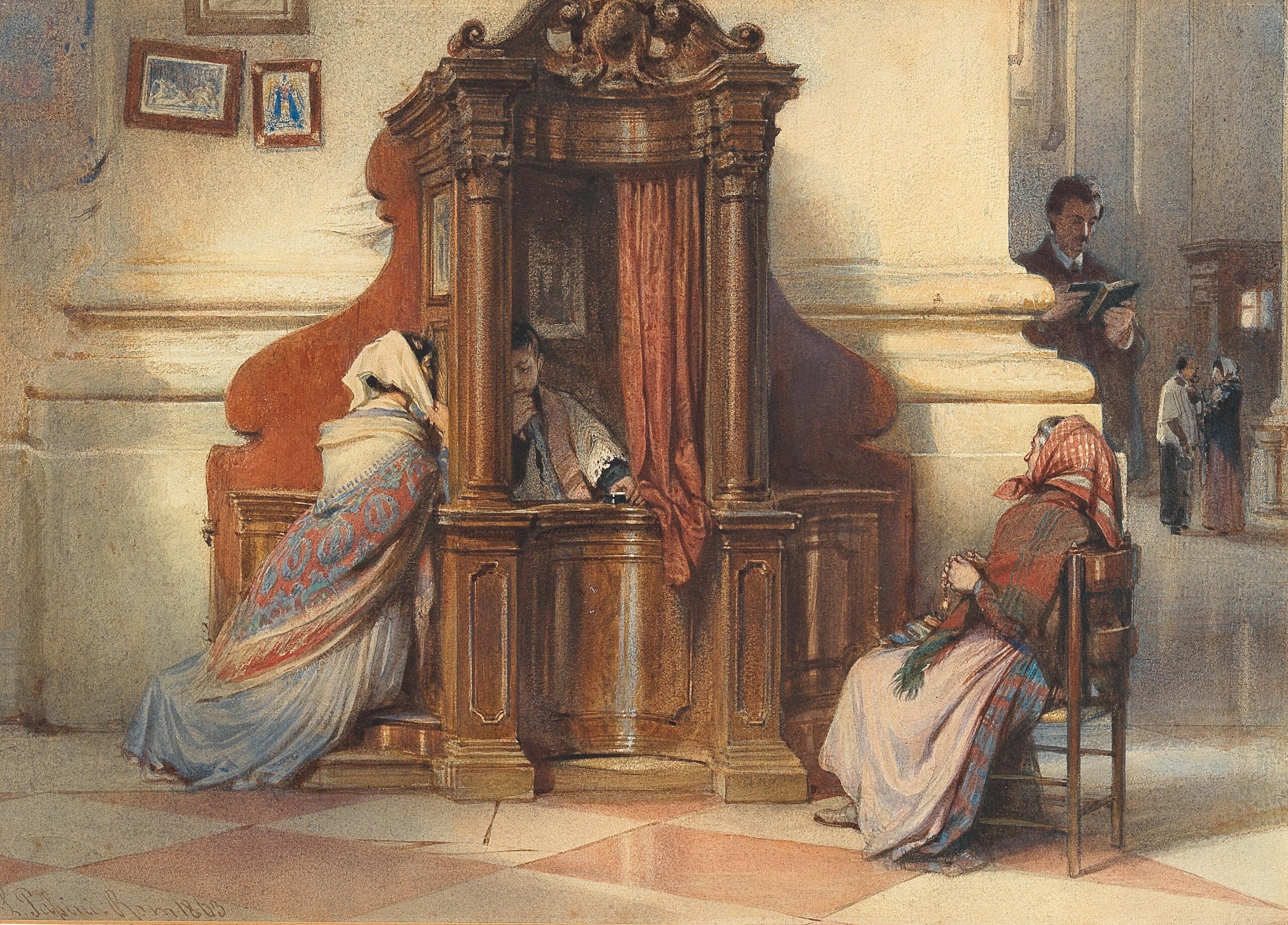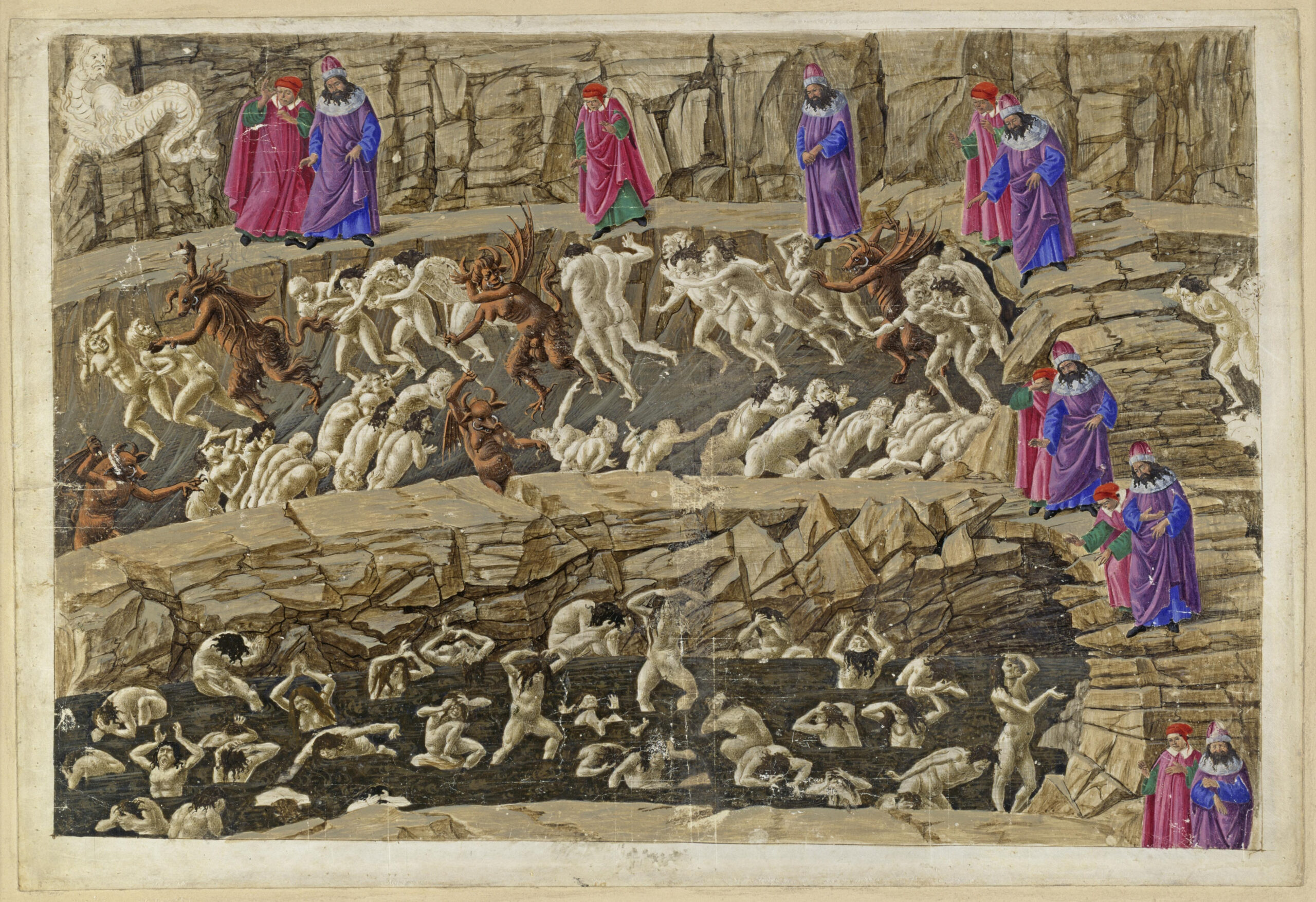Witness the duplicity of Judas, the fervor of Peter, the conversion of the soldiers, and the suffering of Christ throughout the arrest in the Garden of Gethsemane.
Judas’s Plan to Remain an Apostle
When Jesus with the three Apostles went out upon the road between Gethsemani and the Garden of Olives, there appeared at the entrance, about twenty paces ahead, Judas and the band of soldiers, between whom a quarrel had arisen. Judas wanted to separate from the soldiers and go forward alone to Jesus, as if he were a friend returning after an absence. They were to follow, and act in such a way as to make it appear that their coming was altogether unknown to him.
But they would not agree to his proposal. They held him fast, exclaiming: “Not so, friend! Thou shalt not escape us, until we have the Galilean!” And when they caught sight of the eight Apostles, who at sound of the noise came forth from the Garden of Gethsemani, they called up four of the archers to their assistance. But this Judas by no means assented to, and a lively dispute arose between him and the soldiers.
The Soldiers and Disciples Meet
When Jesus and the three Apostles, by the light of the torches, distinguished the armed and wrangling band, Peter wished to repel them by force.
He exclaimed: “Lord, The Eight from Gethsemani are close at hand. Let us make an attack on the archers!”
But Jesus told him to hold his peace, and took a few steps with them back on the road to a green plot. Judas, seeing his plans quite upset, was filled with rage and spite.
Just at this moment, four of the disciples issued from the Garden of Gethsemani and inquired what was going on. Judas began to exchange words with them, and would fain have cleared himself by a lie, but the guards would not allow him to go on. These four last-comers were James the Less, Philip, Thomas, and Nathanael. The last-named, who was a son of the aged Simeon, had along with several others been sent by Jesus’ friends to the eight Apostles in the Garden of Gethsemani to find out what was going on.
They were actuated as much by anxiety as by curiosity. With the exception of these four, all the disciples were straggling around in the distance, furtively on the lookout to discover what they could.
Jesus Identifies Himself
Jesus took some steps toward the band and said in a loud, distinct voice: “Whom seek ye?”
The leaders answered: “Jesus of Nazareth,” whereupon Jesus replied: “I am He.”
But scarcely had He uttered the words when, as if suddenly attacked by convulsions, they crowded back and fell to the ground one upon another. Judas, who was still standing by them, became more and more embarrassed. He looked as if desirous of approaching Jesus; consequently the Lord extended His hand, saying: “Friend, whereto art thou come?”
Judas, confused and perplexed, stammered out something about a commission he had executed. Jesus in reply uttered some words like the following: “Oh, how much better it would have been for thee hadst thou never been born!”
Meanwhile the soldiers had risen and approached the Lord and His Apostles, awaiting the traitor’s sign, the kiss. Peter and the other disciples gathered around Judas, calling him a thief and a traitor. He tried to free himself by all kinds of excuses, but just at that moment up came the soldiers with offers of protection, thus openly witnessing against him.
Jesus again inquired: “Whom seek ye?”
Turning toward Him, they again answered: “Jesus of Nazareth.”
Jesus again replied: “I am He. I have already told you that I am He. If you seek Me, let these go.”
At the words, “I am He,” the soldiers fell to the ground a second time. They writhed as if struck with epilepsy, and Judas was again surrounded by the other Apostles, for they were exasperated to a degree against him.
Betrayed With a Kiss
Jesus now called out to the soldiers: “Arise”—and they arose, full of terror. Judas was still struggling with the Apostles, who were pressing up against the guards. The latter turned upon them and freed the traitor, urging him anew to give them the sign agreed upon. They had been ordered to seize no one but Him whom Judas would kiss.
Judas now approached Jesus, embraced Him and kissed Him with the words: “Hail, Rabbi!”
Jesus said: “Judas, dost thou betray the Son of Man with a kiss?”
Peter Strikes the Servant Malchus
The soldiers instantly formed a circle around Jesus, and the archers, drawing near, laid hands upon Him. Judas wanted at once to flee, but the Apostles would not allow him. They rushed upon the soldiers, crying out: “Lord, shall we strike with the sword?”
Peter, more impetuous than the rest, seized the sword and struck at Malchus, the servant of the High Priest, who was trying to drive them back, and cut off a piece of his ear. Malchus fell to the ground, thereby increasing the confusion.
At the moment of Peter’s impetuous movement, the actors in the scene were situated as follows:
Jesus was in the hands of the guard, who were about to bind Him, and forming a circle around Him at some little distance were the soldiers, one of whose number, Malchus, had been laid low by Peter.
The other soldiers were engaged, some in driving back the disciples that were approaching too near, and some in pursuing those that had taken to flight. Four of the disciples were wandering around, timidly showing themselves only here and there in the distance.
The soldiers were still too much alarmed by their late fall, and too much afraid of weakening the circle around Jesus, to make any very active pursuit, Judas, who immediately after his traitorous kiss wanted to make his escape, was met on his way by some of the disciples, who overwhelmed him with reproaches.
Six official functionaries hastened to his rescue, while the four guards were busy around Jesus with cords and bands, being on the point of binding Him.
This was the state of affairs when Peter struck down Malchus, and Jesus said: “Peter, put up thy sword, for whoever takes the sword shall perish by the sword. Thinkest thou that I cannot ask My Father to send Me more than twelve legions of angels? Shall I not drink the chalice that My Father has given Me? How will the Scriptures be fulfilled if it shall not thus be done?”
Jesus Heals Malchus
Then He added: “Suffer Me to heal the man!” And going to Malchus, He touched his ear and prayed, and at the same moment it was healed.
The guard, the executioners, and the six officers surrounded Jesus. They mocked Him, saying to the crowd: “He has dealings with the devil. It was by witchcraft that the ear appeared to be cut off, and now by witchcraft it appears to be healed.”
Then Jesus addressed them: “Ye are come out with spears and clubs, to apprehend Me as if I were a murderer. I have daily taught among you in the Temple, and ye dared not lay hands upon Me; but this is your hour and the hour of darkness.”
They ordered Him to be bound still more securely, and said to Him deridingly: “Thou couldst not overthrow us by Thy sorcery!”
And the archers said: “We shall deprive Thee of Thy skill!”
The Conversion of Malchus and Others
Jesus made some reply that I cannot recall, and the disciples fled on all sides. The four executioners and the six Pharisees did not fall to the ground, nor did they in consequence rise again. The reason of this was revealed to me. They were in the same rank as Judas, that is, entirely in the power of Satan. Judas did not fall at the words of Jesus, although he was standing among the soldiers.
All those that fell and rose up again were afterward converted and became Christians. Their falling and rising were symbolical of their conversion. They had not laid hands upon Jesus; they merely stood around Him. Malchus was, after his healing, already converted to such a degree that he only kept up appearances in respect to the service he owed the High Priest; and during the following hours, those of Jesus’ Passion, he ran backward and forward to Mary and the other friends, giving them news of all that was taking place.
ooo
This article is taken from a chapter in The Life of Jesus Christ and Biblical Revelation Volume 4 by Blessed Anne Catherine Emmerich which is available from TAN Books.


